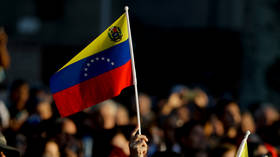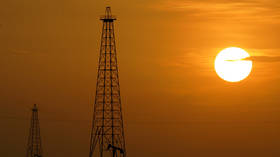US to retain ‘maximum pressure’ on Venezuela – sources

The US will continue to exert “maximum pressure” on Venezuela through sanctions, anonymous officials have told multiple media outlets. The sources stated that President Joe Biden will maintain the bellicose approach of his predecessor, Donald Trump.
However, they added that he could ease penalties under certain conditions. Some form of relief for Venezuela, from American embargoes, has been proposed, by various analysts, since Russia launched its military offensive in Ukraine.
While the White House has expressed willingness to scale back some sanctions on Caracas if President Nicholas Maduro agrees to meet with opposition leaders, Washington’s general policy will remain the same, unnamed officials cited by the Miami Herald, McClatchy, and Reuters said on Tuesday.
The US recognises the activist Juan Guaido as the so-called "interim president" of the South American country.
“We want to be very clear about this point: Sanctions on the Maduro regime will remain in place,” said one US official familiar with the matter. “We are not doing this to reverse Trump’s maximum pressure campaign. Our policy, overall, has not changed.”
Trump embarked on ‘maximum pressure’ campaigns against a number of countries during his time in office, chief among them Iran and Venezuela, imposing layer after layer of penalties intended to isolate and cripple their economies.
If implemented, sanctions relief would include a license for oil giant Chevron to begin negotiations for future business in Venezuela, as US companies are currently barred from any dealings in the country.
“It’s a narrow license authorizing Chevron to negotiate the terms of their potential future activities in Venezuela – but this is all contingent on steps being taken that are positive by the Maduro regime,” a senior US official said. “Further authorization would be needed for Chevron to get into any sort of agreement.”
According to Reuters, Venezuelan Vice President Delcy Rodriguez said on Tuesday that her government hopes partial sanctions relief will ultimately “pave the way for a total lifting of restrictions.”
A former high-level Venezuelan energy official, and relative of Maduro’s wife, Carlos Erik Malpica-Flores, would also be removed from the US sanctions blacklist under the prospective agreement, the source claimed. Any additional relief would depend on the result of talks in Mexico City, they added, adding that the current offer was coordinated with opposition figures.
“It is very important to stress that this was done in coordination with the interim president, Juan Guaido, to move the talks forward,” the official said, referring to the opposition figure. “This is something that they thought would be helpful for the talks to move forward.”
The US State Department reiterated Washington’s support for Guaido earlier this month, saying it remains committed to “peaceful restoration of democracy” in Venezuela.
The reported discussions about easing sanctions come after a US delegation met with counterparts in Caracas in March, where they successfully negotiated the release of two American detainees.
American officials acknowledged that oil was also discussed during the meetings, though then-White House press secretary Jen Psaki later denied that Washington was considering an energy deal with Venezuela. The White House has sought alternatives for Russian oil after exports were effectively cut off by heavy sanctions imposed in response to the attack on Ukraine.
While the Latin American nation holds some of the world’s largest oil reserves, its current output lags at around just 600,000 barrels per day and is heavily constrained by a lack of foreign investment, thanks in part to US sanctions. A potential deal with Chevron could be attractive to the Maduro government, which has presided over a dire economic crisis that’s seen large numbers of residents leave the country in search of work.














